
In Greek mythology, Achilles or Achilleus was a hero of the Trojan War, the greatest of all the Greek warriors, and the central character of Homer's Iliad. He was the son of the Nereid Thetis and Peleus, king of Phthia.

In Greek mythology, Agamemnon was a king of Mycenae who commanded the Greeks during the Trojan War. He was the son of King Atreus and Queen Aerope, the brother of Menelaus, the husband of Clytemnestra, and the father of Iphigenia, Electra, Laodike, Orestes and Chrysothemis. Legends make him the king of Mycenae or Argos, thought to be different names for the same area. Agamemnon was killed upon his return from Troy by Clytemnestra, or in an older version of the story, by Clytemnestra's lover Aegisthus.
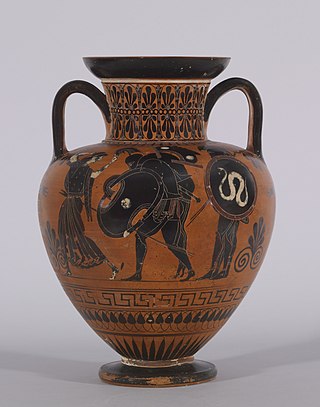
Ajax or Aias is a Greek mythological hero, the son of King Telamon and Periboea, and the half-brother of Teucer. He plays an important role in the Trojan War, and is portrayed as a towering figure and a warrior of great courage in Homer's Iliad and in the Epic Cycle, a series of epic poems about the Trojan War, being second only to Achilles among Greek heroes of the war. He is also referred to as "Telamonian Ajax", "Greater Ajax", or "Ajax the Great", which distinguishes him from Ajax, son of Oileus, also known as Ajax the Lesser.
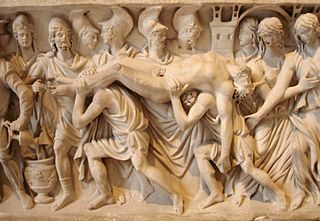
In Greek mythology, Hector is a Trojan prince, hero and the greatest warrior for Troy during the Trojan War. He is a major character in Homer's Iliad, where he leads the Trojans and their allies in the defense of Troy, killing countless Greek warriors. He is ultimately killed in single combat by Achilles, who later drags his dead body around the city of Troy behind his chariot.

In Greek mythology, Priam was the legendary and last king of Troy during the Trojan War. He was the son of Laomedon. His many children included notable characters such as Hector, Paris, and Cassandra.

In Greek mythology, the Trojan War was waged against the city of Troy by the Achaeans (Greeks) after Paris of Troy took Helen from her husband Menelaus, king of Sparta. The war is one of the most important events in Greek mythology, and it has been narrated through many works of Greek literature, most notably Homer's Iliad. The core of the Iliad describes a period of four days and two nights in the tenth year of the decade-long siege of Troy; the Odyssey describes the journey home of Odysseus, one of the war's heroes. Other parts of the war are described in a cycle of epic poems, which have survived through fragments. Episodes from the war provided material for Greek tragedy and other works of Greek literature, and for Roman poets including Virgil and Ovid.
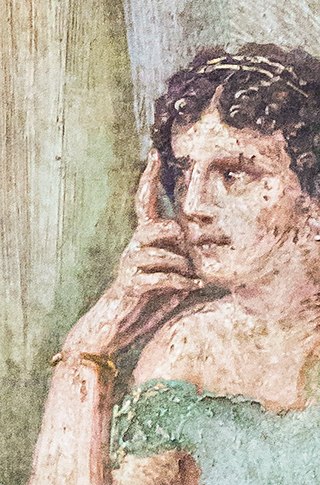
Thetis is a figure from Greek mythology with varying mythological roles. She mainly appears as a sea nymph, a goddess of water, and one of the 50 Nereids, daughters of the ancient sea god Nereus.

Briseis, also known as Hippodameia, is a significant character in the Iliad. Her role as a status symbol is at the heart of the dispute between Achilles and Agamemnon that initiates the plot of Homer's epic. She was married to Mynes, a son of the King of Lyrnessus, until the Achaeans sacked her city and was given to Achilles shortly before the events of the poem. Being forced to give Briseis to Agamemnon, Achilles refused to reenter the battle.

Troy is a 2004 epic historical war film directed by Wolfgang Petersen and written by David Benioff. Produced by units in Malta, Mexico and Britain's Shepperton Studios, the film features an ensemble cast led by Brad Pitt, Eric Bana, Sean Bean and Orlando Bloom. It is loosely based on Homer's Iliad in its narration of the entire story of the decade-long Trojan War—condensed into little more than a couple of weeks, rather than just the quarrel between Achilles and Agamemnon in the ninth year. Achilles leads his Myrmidons along with the rest of the Greek army invading the historical city of Troy, defended by Hector's Trojan army. The end of the film is not taken from the Iliad, but rather from Quintus Smyrnaeus's Posthomerica as the Iliad concludes with Hector's death and funeral.
Paris is a rock musical written by Australian rock musician Jon English and David Mackay between 1987 and 1990, based on the myth of the Trojan War. A concept album was released in Australia in 1990 with the first stage production taking place in Sydney in 2003.

The relationship between Achilles and Patroclus is a key element of the stories associated with the Trojan War. In the Iliad, Homer describes a deep and meaningful relationship between Achilles and Patroclus, where Achilles is tender toward Patroclus, but callous and arrogant toward others. Its exact nature—whether homosexual, a non-sexual deep friendship, or something else entirely—has been a subject of dispute in both the Classical period and modern times. Homer never explicitly casts the two as lovers, but they were depicted as lovers in the archaic and classical periods of Greek literature, particularly in the works of Aeschylus, Aeschines and Plato.

There are a wide range of ways in which people have represented the Trojan War in literature and the arts.
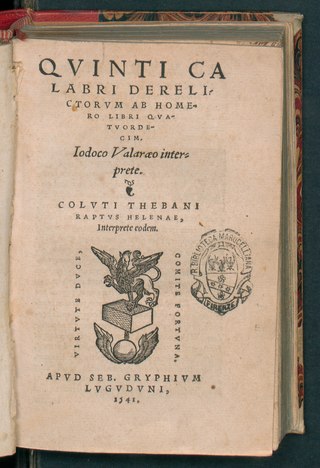
The Posthomerica is an epic poem in Greek hexameter verse by Quintus of Smyrna. Probably written in the 3rd century AD, it tells the story of the Trojan War, between the death of Hector and the fall of Ilium. The poem is an abridgement of the epic poems Aethiopis and Iliou Persis by Arctinus of Miletus and the Little Iliad by Lesches, all now-lost poems of the Epic Cycle.

The Iliad is one of two major ancient Greek epic poems attributed to Homer. It is one of the oldest extant works of literature still widely read by modern audiences. As with the Odyssey, the poem is divided into 24 books and was written in dactylic hexameter. It contains 15,693 lines in its most widely accepted version. Set towards the end of the Trojan War, a ten-year siege of the city of Troy by a coalition of Mycenaean Greek states, the poem depicts significant events in the siege's final weeks. In particular, it depicts a fierce quarrel between King Agamemnon and a celebrated warrior, Achilles. It is a central part of the Epic Cycle. The Iliad is often regarded as the first substantial piece of European literature.

Ransom (2009) is a novel by Australian author David Malouf. It retells the story of the Iliad from books 22 to 24.
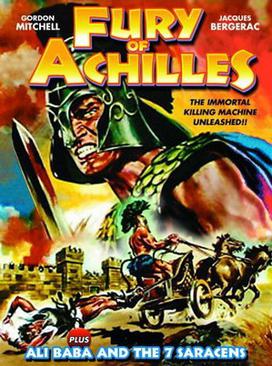
L'ira di Achille, internationally released as The Fury of Achilles, is a 1962 Italian historical drama set in the ninth year of the Trojan War and is based primarily on Homer's Iliad. The film was directed by Marino Girolami and starred Gordon Mitchell as Achilles. It was released in the UK in 1963 as ACHILLES and was filmed in EuroScope and Eastman Color.

The Song of Achilles is a 2011 novel by American writer Madeline Miller. Set during the Greek Heroic Age, it is an adaptation of Homer's Iliad as told from the perspective of Patroclus. The novel follows Patroclus' relationship with Achilles, from their initial meeting to their exploits during the Trojan War, with focus on their romantic relationship. In 2012, The Song of Achilles was awarded the Orange Prize for Fiction.

Troilus and Cressida is a play by William Shakespeare, probably written in 1602.
Troy is an opera in two acts by Bujor Hoinic set to a Turkish-language libretto by Artun Hoinic, based on the ancient Greek epic poem Iliad by Homer. It premiered in Ankara, Turkey, in 2018 and was restaged at Bolshoi Theatre in Moscow, Russia, in 2019.















